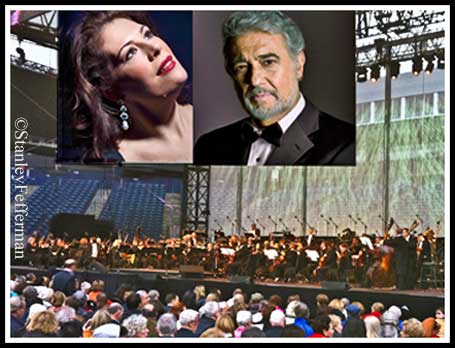
Saturday, June 4, 2011. Rexall Centre, Toronto, Canada.
Huge excitement! Huge stars, huge voices, huge orchestra and huge audience at Rexall Centre amphitheatre for the opening of the Capital One BlackCreek Summer Music Festival. HUGE success.
Picture an operatic concert staged like a rock concert: stadium venue, crawling with wired techs and security, celebs roaming the aisles, late start, chill weather, full gowns white tie ‘n tails orchestra and chorus waiting onstage while the first music— Gershwin’s “Rhapsody in Blue”—blares out BlackCreek Productions’ promo on overhead Telescreens. What?
The ‘real’ music—from the orchestra—begins when Eugene Kohn waves his baton and sounds of “Prelude and Chorus” from Mascagni’s Cavelleria Rusticana reach our ears. The Mark Fisher amplified orchestral sound seems a bit watery and bass-heavy in this hall-without-a-wall. However the chorus comes through powerfully and my nostalgia for ‘natural’ sound begins to melt.
Plácido Domingo takes the stage solo like a pontiff before a pious community and invokes the blessings of the divinity of opera with “O souverain” from Massenet’s Le cid. The tessitura of his tenor shines, albeit darkly, establishing a mood of confidence.
Ms. Radvanovsky’s entrance is a prolonged seductive dance—a bit strange, actually—but when she begins to sing Elena’s “Bolero” from vespri siciliani by Verdi, her plush sound soars above the orchestra, then performs a finely nuanced dive into softness so detailed it takes your breath away, and establishes a mood of excitement that never goes away.
Maestro Domingo joins her for the duo from Verdi’s Simon Boccanegra. They sing “Figlia! a tal nome io palpate”and embrace as they act convincingly the scene in which the Doge Boccanegra realizes that Amelia is his long-lost daughter. Their combined tones and colours in this aria, so tender and sad, shed a splendour that seems somehow more precious in this popular setting than it might on an operatic stage.
Ms. Radvanovsky intensifies the mood of pathos into the unbearable with the aria “La mamma morta” from Giordano’s political drama André Chenier. She becomes Maddalena telling the tyrant Gérard that she will let him love her body, but he needs to understand she will allow it only to save the life of her lover André, and that she, who brings terrible fortune to those who love her, is already dead. You wouldn’t think this is a song for a Saturday night, but Ms. Radvanovsky wowed us with it.
“Nemico della patria”? also from André Chenier, is a solo on a political theme that probably acknowledges the celebration of Italy’s 150th Unification anniversary. In this baritone aria, Domingo as Gérard projects a heavy, authoritarian energy, while he asks himself whether he is “Nemico della patria”(An enemy of his country)? As he reflects on his disillusionment with power, his own corruption and his enslavement to sensuality, one’s mind cannot help straying to the present ongoing scandal around Italian Premier Silvio Berlusconi. But, for tonight at least, the bottom line is the undeniable power and majesty of Plácido Domingo’s 50-years-in- the-making singing voice.
The orchestra and chorus make a wonderful comment on the relation of passion and patriotism with their “Triumphal Chorus” from Aida. Rousing trumpets, crashing cymbals—Maestro Kohn’s vivid and articulate conducting seduces every bit of juice out of his all-star orchestra, featuring Marie Bérard and Annalee Pattipatanakoon among the violins, Douglas Perry, Roman Borys and Susan Hoeppner leading the violas, cellos and flutes respectively, to mention only a few.
The finale of the first half, in the way of opera, celebrates another tragic union. Domingo is hammered brass and Radvanovsky is ivory, silk and rubies as they perform one of Verdi’s most expansive love duets, “Già nella note” from Otello.
The second half of the concert was mostly love and lights of Broadway. I enjoyed Domingo’s “Some Enchanted Evening,” but couldn’t forget Ezio Pinza. I love Sondra’s voice, but “I Could Have Danced All Night” with Julie Andrews, all the same. In Bernstein’s “Tonight” from West Side Story the voices and diction of this awesome operatic duo were so over-supported, it was impossible to imagine them as street-kids Maria and Tony.
That said, I do not begrudge these stellar singers one second of the seven encores, with singing, dancing and fireworks that they inspired. They did their job, as Maestro Domingo himself put it, of making the public ‘complicit’ in a musical performance whose aim is “to make people happy by making us forget our problems.”
So cheers to everyone who stepped up magnificently and made this an unforgettable evening.
The Capital One BlackCreek Summer Music Festival continues through the summer until August 21 with sixteen more shows. You can find details here.
